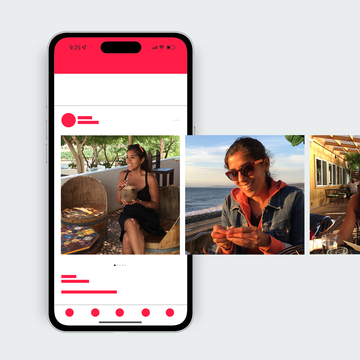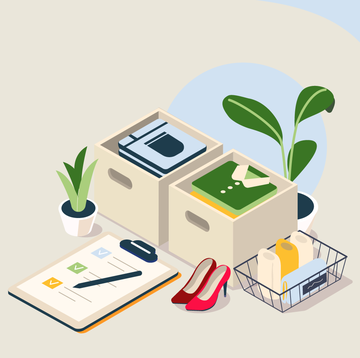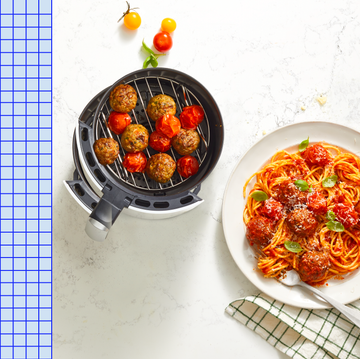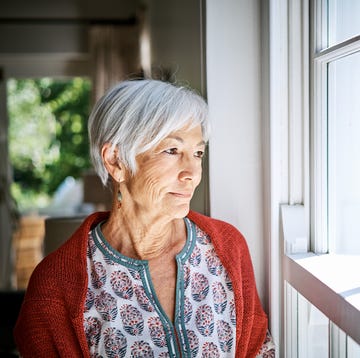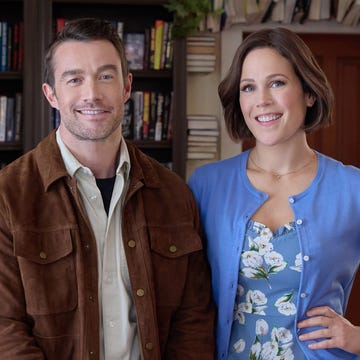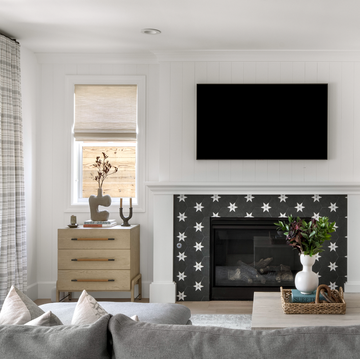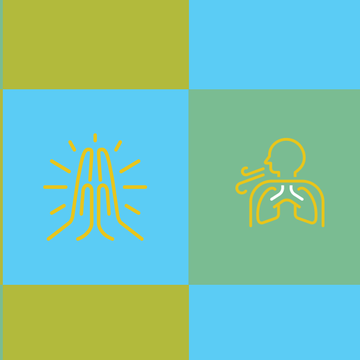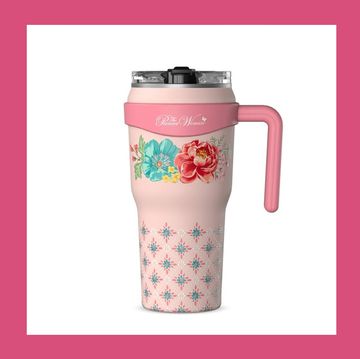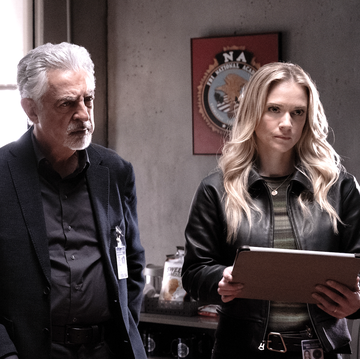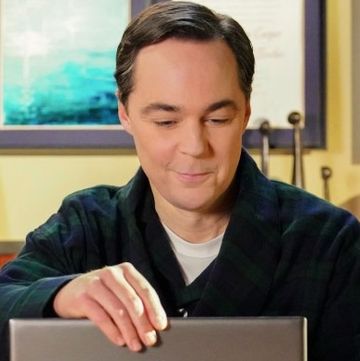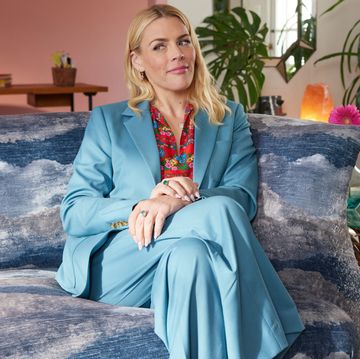In 2019, Ali Stroker became the first wheelchair-using actor to appear on Broadway and be nominated for and win a Tony Award. Recently, she served as guest editor for Good Housekeeping's first-ever Accessibility Special issue (out now!). Her influential voice and her passionate advocacy for people with disabilities — particularly young girls — have been instrumental in grounding and sharpening our coverage. — Jane Francisco, Editor-in-Chief
Being in a wheelchair has helped me develop a level of patience, creativity and resilience that I wouldn’t have otherwise. Sure, it has also tested and challenged me. I’ve doubted myself along the way. But it certainly hasn’t prevented me from chasing my dreams. One hundred years ago, my dreams wouldn’t have been possible — as someone in a wheelchair, I wouldn’t have been allowed to attend school, much less perform on Broadway.
Still, it’s hard to believe the Americans with Disabilities Act, a long overdue law that protects people with disabilities in many areas of public life, was passed only three decades ago. We’ve come a long way, but there’s still work to do. Even now, when someone sees a disabled person, their first question is often “What’s wrong?” As that question implies, disability has been associated with shame for far too long. Don’t look; don’t stare; don’t ask; don’t engage. But I’m not ashamed of my disability at all: In fact, I’m grateful for it. Keep this in mind: If you decide to approach someone who is disabled (it’s not always necessary), don’t ask what’s wrong. Introduce yourself and ask, “What’s your story?” Here’s a bit of mine:
On her life in a wheelchair
As kids, my brother and I were in a car accident that left me paralyzed from a spinal cord injury and him with a traumatic brain injury. I was injured when I was 2, so for as long as I can remember I’ve been in a wheelchair. But there isn’t a feeling of missing my “other life” — my chair and being paralyzed are normal to me. That may be hard to imagine for somebody who does not have a disability. But for me, my disability is not “different”; it’s just a part of me.
On learning to love her disability
For some, accepting — let alone loving — their disability is really difficult. A lot of people can’t or don’t, and they’re left to carry this weight of being a victim or feeling “less than,” or having shame. Some people wish that their disability weren’t a part of their lives, and it’s fine to be in that place, but what do you do next?
I believe that when you’re disabled, it takes a certain amount of will to navigate the world and create a life that is fulfilling. And a lot of that comes from understanding and believing
in your worth.
On growing up disabled
After the accident, my parents were determined to surround my brother and me with people who were positive, people who believed in us. We were always busy, always doing things. There wasn’t a moment to pause and feel sorry for ourselves. My mom says that when we got hurt, she found her voice: She learned what it meant to advocate, and she advocated for us with doctors and teachers, ensuring that we were seen as people.
My dad was super-creative. He would always say, “Let’s think outside the box.” And if somebody was saying that we didn’t belong, he taught us to either make it work or leave. My dad is a coach, so he was also focused on getting the best team around us: really great teachers, really great physical therapists, really great occupational therapists, really great babysitters and so on. We made a culture in which our motto was “Yes, you have a disability, but that’s not going to stop you.” And that was very powerful for me as a kid.
In the midst of all of this, I told myself I’d be on Broadway one day, even though no one had ever done so in a wheelchair. Nothing was going to stop me — I knew performing on that stage was what I was meant to do. It’s no surprise, given my family’s perspective, that my dream of Broadway was what we put all our attention on, from my taking voice lessons to my enrolling in acting classes and going into the city to see plays. Over time, I started to get really good, and the dream felt like it could become a reality.
I’m just so grateful for my parents. They’re still such a huge part of my life. They’re both
just dedicated to my family and me in a way that continues to blow my mind.
On asking for help — and telling you how to do it
As a kid, I remember feeling a lot of discomfort about the extra help I needed. I didn’t want to be different, especially in middle school; I just wanted to fit in. Sometimes that feeling still comes up for me as an adult. There are times when I wish I didn’t need accommodations, that the world were just accessible and I could get where I needed to go without so much forethought. But I know that’s not the reality. So whether I am at work, at home, at a restaurant or on vacation, my goal is to be independent, even if it takes creativity. That’s what makes me feel most empowered.
Sometimes that independence comes with needing a hand. For example, for me to travel on my own, I have to ask for help at certain airports where there’s carpet or steep ramps, as well as when I’m boarding a plane or bringing my bags into a hotel. There are a lot of places where I have to advocate for myself. But I have a choice about how I do that.
For example, when I moved to New York City, I was taking taxis everywhere. Every time I got into a taxi I had to explain to the driver how to take apart my wheelchair, put
it in the trunk and then take it out again and put it back together. This happened multiple times a day. I decided not to frame this situation as Oh, poor me, I have to ask for help all the time but instead as me giving somebody else an opportunity to feel helpful. Generally people like to help and feel useful.
Another way in which I frame asking for help is to think of it as if I’m hosting a party. Instead of feeling like I’m just at the receiving end of the help that somebody is giving me,
I get to show them how to help in the way I need it. When people are nervous about helping, I get to reassure them by saying, “Don’t worry, I’ll tell you exactly what to do. You’re going to do great.” I’m the host, and this is my party.
This is important for nondisabled people to hear: A lot of nondisabled people take the lead and decide to help in a way they think I need it. For example, they’ll pick up my wheelchair while I’m trying to put it together next to my car — and that is not what I need, because I’m using the chair to balance myself while I’m putting the wheel in, and if they move my chair, I tumble out of the car. So to help in a way that’s beneficial, you have to listen to me and hear what I need. Your doing so keeps me safe and makes the whole experience much easier for everyone.
On parenting her young son, Jesse
If I could grant one thing to everyone who’s in a wheelchair, especially parents, it would be wide and smooth floors. One of the things Jesse and I will do, especially in the winter, is go to the mall or to Target, because those places are super-accessible for us. I don’t have to think, Oh no, we’re at the zoo — I can’t get over these wood chips or We’re at the farm and there’s a hill. In accessible places, I don’t have to worry about getting around as much, and it makes me feel like I can be the best mom that I can be. Jesse is amazing with me. He was wanting to stand at 3 months old, I think in part because he had adapted to what I could do with him. My balance isn’t that good, so when I would bend over to put him down, he would land on his feet early on, and that really helped me. His core strength has always been high as well because he’s been on my lap his whole life. I’m not holding him with two arms — he’s got a strap around him, or he has one arm around him. This is Jesse’s normal, and I believe he is better because of my disability.
This story originally appeared in the May/June 2024 issue of Good Housekeeping. Subscribe to Good Housekeeping here.





